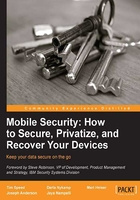
Troy and You
Did some of Troy's day sound familiar? Smartphones have become multifunctional tools for many of us. We use them for communicating, surfing the Internet, checking sports scores, and even shopping and banking. Some of these actions can be done semi-anonymously, while others require information about who we are or even sensitive information, such as credit card and bank account numbers. It is the same in the physical world: we can do some activities without anyone knowing who we are, while other activities require us to share very personal information. The digital world generally feels more anonymous than the physical world because it appears we are only interacting with machines. However, the reality is very different.
In the physical world, you are an individual who can be recognized on sight by anyone who knows you. You can prove who you are to those who don't know you by offering proof of identity such as a driver's license or passport. It is your choice when and with whom you share that information. A pickpocket could steal your wallet with your driver's license in it, and your passport. With either item, the pickpocket would know your identity, street address, date of birth, and a few other pieces of information, but that is all. Within minutes, hours, or days, you would know your items had been stolen because you would no longer have them in your possession.
In the digital world, your identity is digital information, which can be copied, combined, analyzed, and tracked. A person anywhere in the world can steal your information by copying it, and then adding it to other information about you. The additional information may have been copied by the same person who previously stole information about you, or it may have been purchased on the Internet black market as part of a set of information on thousands or even millions of people. You may never know your information has been copied unless it is later used to steal your identity. Unlike a missing driver's license or passport, only a copy of the information is taken while the original information remains intact.
With your digital identity, another person, or even many other people, can become you. They can obtain credit in your name, buy cars or houses in your name, sell your house (as was done to Roger Mildenhall of South Africa), or even commit crimes while masquerading as you (http://www.identitytheft.info/criminal.aspx). If you have plenty of free time and extra money to spare sorting out messes such as these, then you probably don't need to worry about protecting your digital identity. Otherwise, fasten your seatbelt.